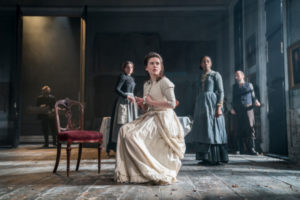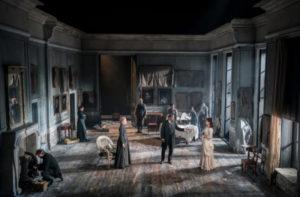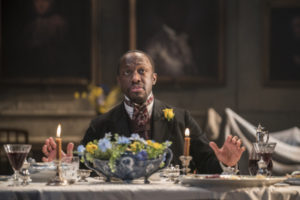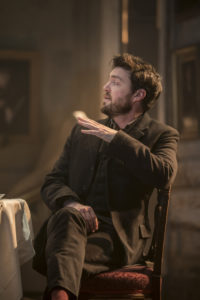Why Steve Coogan is better than Peter Sellers in Dr Strangelove
★★★★
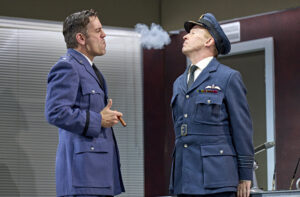
I don’t know what’s more spectacular, the production of Dr Strangelove or Steve Coogan‘s triumphant performance as four different characters. He’s hardly ever off stage and he generates most of the laughs. The script has some flaws, but these are far outweighed by the enjoyment gleaned from this magnificent show.
You might be wondering whether a film made in the 1960s about how a nuclear war might be triggered stacks up as a comedy for today. It does creak occasionally but it is funnier and more relevant than you might expect. I’ll return to that but more to the point is that Dr Strangelove is a vehicle for the powerful comic acting of Steve Coogan, following in the footsteps of the film’s star Peter Sellers by playing multiple roles. As well as constantly changing costumes, he is hardly off the stage. He deserves an award for stamina, as well as any others he will deservedly accrue.
The action starts at a US air base in Britain. The hut interior with its massive Venetian blinds, just waiting to be disrupted, is the first of a series of great sets by Hildegard Bechtler (who also designed the set for the current production of Oedipus). We meet the first and possibly the best of four brilliant characters created by Steve Coogan. He’s a RAF Captain Mandrake, shocked that the US commander has launched an unauthorised nuclear attack on Russia. It’s a masterpiece of British reserve, politeness and beating around the bush in the face of the utter madness of General Ripper played hilariously by a cigar-chomping, carpet-chewing and suitably square-jawed John Hopkins.
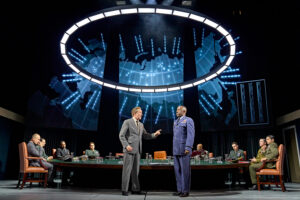
Next, we are in a spectacular War Room with a huge electronic map or ‘Big Board’ as they call it working over the scene, showing targets as ‘circles, squares and squiggly bits’. Here, a panicking mix of politicians and military men have gathered in response to the news. Mr Coogan is the level-headed US President Muffley surrounded by war-mongering generals, led by an excellent Giles Terera as General Turgidson, maintaining a stiff military stance but always on the verge of jumping up and down with childish excitement.
Also in the room is Russian Ambassador Bakov (the amusing names keep on coming), played by Tony Jaywardena, who disintegrates from swaggering confidence to paralysing fear as he realises his fate is in the hands of his unpredictable and possibly mad leader.
There’s some excellent sleight of hand when Mr Coogan changes to Dr Strangelove, a former German scientist now masterminding the US nuclear response. He holds down his arm to prevent it making Nazi salutes, always with a reassuring ’I hated that’, while clearly looking forward to a new Reich. Mr Coogan plays down the German fanatic stereotype which makes his explanation of the logic of having automatic responses to the use of nuclear weapons without human intervention, and his casual description of the consequences of a nuclear holocaust as chilling as they are funny.
The third set cleverly recreates a bomber plane. The fuselage and landscape below are recreated impeccably, although I’m not sure how visible it would be from the back of the stalls. Sitting in the cockpit with two other members of the crew is the pilot Major TJ Kong, played by Steve Coogan.
It takes some chutzpah to put yourself up for comparison with the great Peter Sellers but Mr Coogan emerges with at least a draw, and he deserves an extra credit for playing all these parts in the course of two hours. Like Mr Sellers, he avoids going for the obvious laughs which could be gained from exaggerating the accents and mannerisms, and other clowning. Instead, they take the characters seriously and allow the humour to come out of the situation, making it all the more believable.
Steve Coogan outdoes Peter Sellers in one respect. That’s by taking on a fourth role, which the star of the film was unable to do owing to an injury. Again it’s a priceless performance as Major T J Kong, as the pilot reverts to cowboy mode. Despite objections and obstacles, he is determined to carry out the mission, but can he be stopped?
A code that will cancel the bombers is essential but Coogan back as RAF Captain Mandrake and in possession of said code has trouble trying to phone the President because of lack of change. This leads to one of the funniest scenes, as he tries to persuade a US soldier to shoot open a vending machine. To the American, vandalising Coca Cola property is a more serious offence than causing World War 3.
This stage show has been adapted by Armando Iannucci and Sean Foley from a 1964 film that satirised the military strategy of Mutually Assured Destruction- the idea that if all the major powers were armed with nuclear weapons they wouldn’t attack for fear of being destroyed themselves. At the time, hot on the heels of the Cuban Missile Crisis, people were actually preparing for the possibility of a nuclear war. Sixty years later, it hasn’t happened. Not that that makes Dr Strangelove a nostalgic trip down memory lane.
Yes, CND (the Campaign for Nuclear Disarmament) is barely mentioned these days and we have become more concerned about the destruction of the planet through pollution and the climate crisis, but the reality is that nuclear weapons have proliferated, making greater than ever the danger of a country, a dictator, or even a terrorist group using them. With an aggressive Putin in power in Russia and an unpredictable President due to take over the US nuclear codes, not to mention nuclear weapons at the disposal of Israel, Pakistan, North Korea and, before long, Iran, this is a timely reminder that it only takes one or two psychopaths with their fingers on the trigger to desolate the world- and how absurd this is.
Giles Terera is excellent as a war-mongering general
Dr Strangelove imagines two such madmen (and the players are all men) setting off a potential nuclear war. In doing so, it exposes fundamental flaws in the macho culture and logic of war that has led them into this corner. So the US generals talk of ‘pre-taliation’, based on the assumption that an accidental attack by them will trigger retaliation and they will need to get in first. It’s satire but it bites deeply into the fanaticism that comes out of the dehumanisation of the opposition.
It’s not a musical but it begins and ends with a chorus line of military personnel dancing to popular songs, the opening number being the most aggressive version of Try A Little Tenderness I’ve ever heard, and ending with Vera Lynn (Penny Ashmore) singing with equal irony the sentimental World War Two song We’ll Meet Again.
The one-liners come thick and fast (‘You can’t fight in here! This is the War Room’) and, thanks to director Sean Foley, the pace rarely lets up. The only problem is that the plot is entirely centred around the question of whether a nuclear war can be prevented. With no subplots or diversions, the humour, never subtle and already dated in parts, becomes progressively predictable: you can only take so many jokes about redneck Americans and the madness of war.
Fortunately, Steve Coogan is magnificent, creating four very different characters and showing perfectly how the best laughs come from taking the comedy seriously. He looked exhausted by the time the curtain came down.
Dr Strangelove can be seen at the Noel Coward Theatre in London’s West End until 25 January 2025, and then at the Bord Gais Energy Theatre from 5 to 22 February 2025. Ticket information here.
Paul was given a review ticket by the producer.
Watch this review on the YouTube channel Theatre Reviews With Paul Seven
